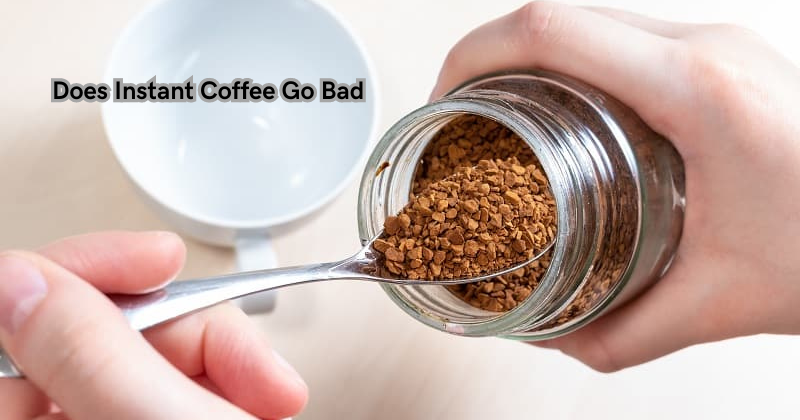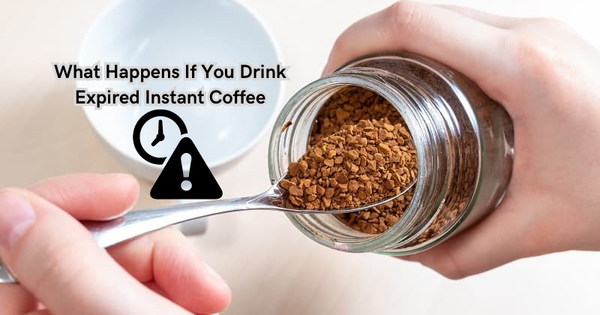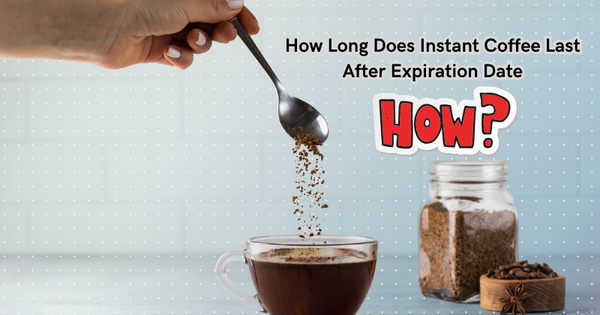Instant coffee is a staple in many households due to its convenience and quick preparation. However, its shelf life can be a concern for coffee enthusiasts. The question "Does instant coffee go bad?" is essential to address, as the quality of the coffee can be affected by various factors over time. Factors such as storage conditions and exposure to air and moisture can impact its longevity.
In this guide, we will delve into the shelf life of instant coffee, signs of deterioration, and best practices for storing it to maintain its flavor and aroma. Join us as we uncover the secrets to preserving the freshness of your favorite instant coffee.
What is Instant Coffee?
Instant coffee is made from brewed coffee beans that have been freeze-dried or dehydrated. This process removes the water content, leaving behind a dry and soluble powder. When mixed with hot water, instant coffee dissolves quickly, making it an easy and convenient option for those who want their caffeine fix in a jiffy.
Furthermore, regular ground coffee may take a few minutes to brew, whereas instant coffee is ready in seconds. This makes it a popular choice for busy individuals and those who need access to brewing equipment.
Does Instant Coffee Go Bad?
The short answer is yes; instant coffee does go bad. However, it has a longer shelf life compared to regular ground coffee due to its low moisture content. Generally, instant coffee can last for up to 20 years if stored properly. This is because the freeze-drying or dehydrating process removes most of the water, leaving behind a dry and stable product. Roast coffee, on the other hand, can last for 1-2 years. Opened instant coffee can last for up to 2 years, while opened ground coffee can only last for a few weeks.
However, the quality of the coffee can deteriorate over time, affecting its flavor and aroma. This is why it's important to store instant coffee properly and consume it within a reasonable timeframe for the best experience. Unopened instant coffee can last for a long time, but it's best to check the expiration date before use.
Signs of Deterioration
Even though instant coffee has a longer shelf life, it can still spoil if not stored correctly. Here are some signs that your instant coffee may have gone bad:
- Changes in color: If the coffee has developed a darker or lighter shade, it could be an indication of spoilage.
- Strange odor: Instant coffee should have a rich and distinct aroma. If you notice any strange or unpleasant smells, it's best to throw it away.
- Clumping: Fresh instant coffee is powdery and easily dissolves in water. If you notice clumps, it could be a sign of moisture exposure, which can cause mold growth.
- Taste: The most obvious sign of spoilage is the taste. If your instant coffee has a bitter or off-flavor, it's best to discard it. Freshly brewed coffee should have a smooth and rich taste.
If you store properly and notice any of these signs, it's best to err on the side of caution and dispose of the coffee.
What are the Factors That Can Affect Instant Coffee's Shelf Life?
Various factors can impact the shelf life of instant coffee. Some of these include:
- Storage conditions: To maintain the quality and freshness of instant coffee, it's essential to store it in a cool, dry place away from direct sunlight. Exposure to heat and moisture can cause mold growth and spoilage.
- Exposure to air: Oxygen can also affect the quality of instant coffee. Once opened, it's best to transfer the contents into an airtight container to prevent exposure.
- Humidity: Instant coffee is susceptible to moisture absorption, which can cause spoilage and clumping. It's best to store it in a dry environment.
Best Practices for Storing Instant Coffee
To ensure your instant coffee stays fresh and flavorful, here are some best practices for storing it:
- Keep it in a cool and dry place: Exposure to heat, light, and moisture can affect the quality of instant coffee. Store it in a cool and dry place, such as a pantry or cabinet.
- Transfer to an airtight container: Once opened, transfer the contents of the instant coffee into an airtight container to prevent exposure to air and moisture.
- Avoid storing near strong odors: Instant coffee can absorb odors from its surroundings, affecting its flavor. Keep it away from strong-smelling foods and spices.
- Check the expiration date: Even though instant coffee has a long shelf life, it's best to check the expiration date before use for optimal freshness.
- Avoid freezing: Freezing instant coffee can cause moisture to form, affecting its quality and taste. It's best to store it at room temperature.
With these best practices, you can ensure the longevity and quality of your instant coffee. Remember that even though it may have a longer shelf life compared to regular ground coffee, it's still important to store and consume it properly for the best experience.
Instant Coffee has White Stuff on It. Is that Mold?
If you notice a white substance on your instant coffee, it's likely due to moisture exposure. This can happen if the container is not properly sealed or if there are changes in temperature and humidity. While it may look like mold, it's actually just clumps of dried coffee particles that have absorbed moisture.
To prevent this, make sure to store your instant coffee in an airtight container in a cool and dry place. If you do notice this white substance, it's best to discard the affected coffee for optimal taste and quality.
How Does The Stale Instant Coffee Taste?
Stale instant coffee may have a bitter and dull taste. This is due to the breakdown of the coffee compounds over time, affecting its flavor and aroma. It may also have an unpleasant odor. Suppose it becomes clumpy and hard, making it difficult to dissolve in water.
To avoid drinking stale instant coffee, make sure to store it properly and check for signs of spoilage before use. Fresh instant coffee should have a rich and distinct flavor, so if you notice any changes, it's best to discard it.
Can You Drink The Expired Instant Coffee?
While drinking expired instant coffee may not harm you, it may have a stale and unpleasant taste. It's best to follow the expiration date for optimal freshness and flavor. If you do decide to consume expired instant coffee, make sure to check for signs of spoilage before use.
Furthermore, expired instant coffee may not provide the same caffeine kick, as the compounds responsible for this effect can break down over time. It's always best to consume your instant coffee before its expiration date for the best taste and experience. Remember to store it correctly and check for signs of deterioration to enjoy your instant coffee at its finest.
FAQs
How do you know if instant coffee is bad?
Some signs that your instant coffee may have gone bad include changes in color, strange odor, clumping, and an off-taste. If stored properly and you notice any of these signs, it's best to discard the coffee.
How long is sealed coffee good for after expiration date?
Sealed instant coffee can last up to 20 years after its expiration date if stored in optimal conditions. However, for the best taste and freshness, it's recommended to consume it within two years of the expiration date. It's always best to check for signs of spoilage before use. Coffee grounds that are exposed to air and moisture can spoil much quicker.
How long can you keep coffee for iced coffee?
Freshly brewed coffee can last up to 2 weeks when stored in the refrigerator. However, for the best taste and freshness, it's recommended to consume iced coffee within a few days of brewing. With ice cube trays, you can even freeze coffee into cubes for a refreshing iced coffee anytime.
How long is ground coffee good for after opening?
Ground coffee can last up to 5 months after opening if stored properly in an airtight container in a cool and dry place. However, for the best taste and aroma, it's recommended to use ground coffee within two weeks of opening. Always check for signs of spoilage before use.
Conclusion
In conclusion, instant coffee can indeed go bad over time, although it has a longer shelf life compared to freshly ground coffee. Factors such as exposure to moisture, air, and light can contribute to the degradation of its flavor and quality. Storing instant coffee in an airtight container in a cool, dark place can help prolong its shelf life.
It's important to note that while it may not pose health risks when consumed past its best-by date, the flavor and aroma may significantly diminish. Regularly checking the expiration date and considering proper storage methods are crucial for ensuring the best coffee experience. When in doubt, using your senses to evaluate the coffee's appearance, smell, and taste can help determine its freshness.



